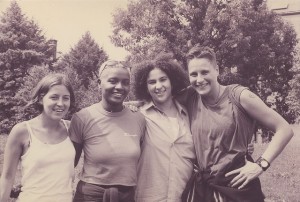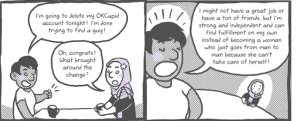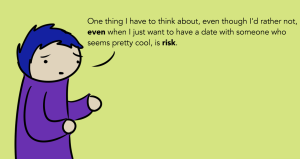
Source: Third Wave Foundation
“That’s so weird,” I frequently hear in college classrooms or social interactions. “They didn’t even sound like crazy feminists. They actually make sense.”
Yes, I absolutely do discuss feminist theory with completely normal humans on a regular basis in simple social situations. And yes, it’s awesome.
Feminism is a creature with many faces these days.
Within the movement itself, there are various media outlets, different angles and belief systems. Even within specific websites such as Everyday Feminism, individual feminists can have different viewpoints on the same feminist issues.
Many times, the dissonance in feminist voices is undermined by the media or cultural narratives. It’s seen as a negative thing. It’s one of the main critiques.
However, I completely believe that the diversity of opinions yield some great personal and political revelations. As long as the conversations are intelligent and open-minded, having differing opinions can be beneficial to feminism. It’s how we realize our own internalized sexism and start moving forward!
Bottom line, the goal is homogenous: Feminism aims for gender equality within a currently patriarchal society.
Sometimes it’s just hard to get massive amounts of people to agree exactly what the best means to achieving that goal is.
Meanwhile, many myths about feminism still persist and thrive, despite efforts to debunk them.
So I’m going to take a slightly different angle.
Outlined below is a list of five things that the current movement of feminism absolutely is.
1. Knowledge
A major and frequently unacknowledged goal of feminism is unveiling aspects of our culture that many people simply don’t know about.
It isn’t out of pretension or judgment of individuals, but rather, the simple fact that a nation as large and diverse as the United States has complex political and sub-cultural webs that no one person can ever navigate alone.
Sharing knowledge helps dispel the notion that feminism is pointless by pointing out that women still make roughly 80% as much as male counterparts in their same jobs, and worse, that people actually defend that discrepancy.
Furthermore, it might help point out the fact that there are both political movements to decimate female reproductive power and beliefs that employee value is dependent upon their reproductive power.
So, these cycles of repressing female power and autonomy then create and sustain cultural and political practices and laws that happen to be based around the very power that has been restricted.
For instance.
Now, of course, many of you already know these things, and many, many more. It’s just an example of issues that aren’t mainstream, which also highlights the fact that once an issue is labeled “women’s” it is a media dead zone.
One major aspect of current feminism is utilizing technological advancements to share knowledge that has been suppressed for decades, and sometimes centuries, about gender identity, development, and cultural ramifications of each – hence the feminist community that exists on the Internet.
Knowledge is power. And we intend to wield both responsibly.
2. Linguistics
One thing that was really emphasized in the second wave of feminism, specifically with women’s workshops, is the way that language reflects social hierarchies.
Language is culturally constructed.
Gender is also culturally constructed, as is race.
So what does that mean exactly?
Race and gender are neither conceptualized nor discussed in the same way across all cultures because each culture either constructs (or does not construct) the idea, and those constructions yield different results.
Similarly, languages have different vocabularies and structures.
Consider for instance, the fact that languages such as German have masculine and feminine nouns. Some languages, such as Greek, have multiple words for what we in English speaking cultures only know how to call “love.”
Language also influences thought.
If someone does not know a word for a phenomenon or idea, it is vastly more difficult to conceptualize and analyze.
Therefore, language has a phenomenal power over internalized ideologies that comprise a culture.
So, in a culture whose worst insults are being a “bitch,” “pussy,” or “cunt” – all of which hold feminine connotations – but has relatively few masculine insults, there are all sorts of gender stereotypes and assumptions circulating in simple daily conversations.
Language is the key to self-identification, identification and understanding of others, and the ability to interact with the world in meaningful ways.
Feminism incorporates linguistic studies to excavate ways to heal cultural wounds of rape language, general acceptance of street harassment, harassment of employees, and generally undermining female intelligence, ability, and strength in everyday life to continually suppress their potential.
Feminism is about deconstructing linguistic patterns that undermine equality and empowerment.
3. Listening
Yes, that’s right.
We’re listening to the media manipulate pervasive cultural stereotypes, and we hear individuals manipulate various spiritual identities to fit whatever platform a specific political party is pushing this year.
We hear co-workers tell us that it’s great that we work so hard, that they totally support single mothers going back to school, and then as soon as our backs are turned, we hear them call us a stupid slut. A bitch. Stuck up.
Feminism is listening when women put each other down over our looks. We hear the internalized sexism of our sisters saying, “I just don’t get along with other women. They’re so catty. I’m not like other women.”
We hear slut-shaming, victim-blaming, fat-shaming, thin-shaming, misogyny, misandry (sometimes even from self-identified feminists who we inherently and completely disagree with), and feminist-shaming. We hear a lot of brutal feminist-shaming.
We are listening when you tell our sons the worst thing they could possibly be is not a rapist or a murderer or a vile, despicable person, but to be a sally or a nancy, a sissy or a pussy.
We hear as you tell our daughters that the worst thing they could be is not destructive or violent, mean or manipulative, but ugly.
One of the most important and underrated goals of feminism is to listen to the cultural messages bombarding us.
You can’t fight a battle until you know what it is.
4. Intersectionality
This is directly related to number three.
Earlier feminist movements made distinct decisions regarding intersectionality.
Some of the most beautiful and inspirational feminists in history were, unfortunately, willing to sacrifice the rights of women of Color to gain rights for white women.
In the United States specifically, there were factions between suffragettes willing to sacrifice Black women in pursuit of their own rights, and those who would not. However, intersectionality was denied in many more subtle ways then and ever since.
For the most part, ever since Elizabeth Cady Stanton and Susan B. Anthony – two white women – instigated the first wave of American feminism in the late 19th Century, most branches of every swing of the movement have been led by white women.
And that’s not to say that they were most qualified or that they had any intention of outright ignoring others.
Most white women, no matter how pure of intention, will have to struggle to identify their own privilege and the very inability to conceptualize struggles beyond their eurocentric culture.
The very fact that women’s issues were enunciated around the struggles of white, middle-class women represents deeply internalized racial privilege.
A feminism that isn’t as actively inclusive of all races, sexual expressions, gender identities, and lifestyles is inherently hypocritical based on its identity as a movement for equality.
That’s why feminism today is a movement of intersectional solidarity, discourse regarding the struggles of all marginalized groups, made possible only by carefully listening to all feminists of all backgrounds and identities in pursuit of this final goal of feminism.
5. Equality of Opportunity
Job opportunities, educational opportunities, internship opportunities, opportunity for promotion, bonus, and benefits, and equal pay are a few of the most mainstream issues.
Equal opportunity also incorporates the linguistic issues: opportunity to be spoken to with the same respect and professional tone as other employees, opportunity not to be whistled or gawked at on the street or while we’re working (or anywhere), and opportunity to feel and express emotion without being demarcated as “crazy” or “hormonal,” the opportunity never, ever again to be asked in response to a grievance if it is due to menstruation.
Feminism seeks equal opportunities not to be called a slut or a prude, never to be labeled a bitch for simply having a voice and ambition.
Equal opportunity also means working toward a culture in which men have the opportunity to express emotion openly, display empathy and kindness without ridicule, to be stay-at-home-dads if that is their passion, and to practice any hobby or sport without verbal emasculation – opportunity for every man to be a “real” man.
Feminism works toward equal opportunities for all genders in every regard because it seems impossible to live freely in a culture that has already written your script for you.
***
Okay, okay, so we’re not out there burning bras, but….
What we do intend to light up is some intelligent discourse.
Talking about the way things are right now will inevitably bring up uncomfortable realities, but it’s the only way to understand each other’s experiences, stories, and perspectives.
The F-word does deal with some controversial topics, but absolutely every belief system anywhere ever touches on those same topics.
Examples? Abortion, contraceptive, prenatal, and other health issues, maternity leave, childcare, child support and custody issues, workplace rights, equal opportunities for employment and education. Need I continue?
It’s also dealing with not-so-political aspects of culture like daily interactions, socially acceptable communication, rape culture, fat-shaming, slut-shaming, objectification and the male gaze, media portrayals of gender roles, family roles. The list goes on.
I’ve been told that it’s frivolous to pursue social discourse in many of these areas.
Thin-glorification, I have been told, for example, should just be accepted because no one intended it to hurt your feelings or incur rampant eating disorder epidemics in first world countries.
Feminism is also about men’s issues because patriarchy is detrimental to male self-actualization, as well.
When you get down to it, feminism is far more concerned with combining forces to create equality for everyone.
Because Western civilizations tend to be patriarchal, feminism hinges on the belief that the starting ground places men in an entitled position. That is not the same thing as saying that men have it easier or that men are to blame for social issues.
We are striving to identify different types of inequalities and privilege that hinder the equal ability to pursue self-actualization and its (hopefully) ensuing happiness.
The bottom line is that the perception of feminism is more warped than a fun-house mirror.
I’m sure you’ve heard dirty, rotten things about the bitchy, judgmental, crazy, hairy, man-hating feminist crowd.
But the truth is: My feminist friends have the biggest hearts, minds, and aspirations of anybody I know.
And the really cool feminists are the ones that acknowledge, embrace, and explore that very fact.
Want to discuss this further? Login to our online forum and start a post! If you’re not already registered as a forum user, please register first here.
Kelsey Lueptow is a Contributing Writer at Everyday Feminism. Kelsey is a small town amateur yogi, poet, and feminist from Wisconsin. She’s a single mother and seasonal waitress working on a Bachelor’s degree in Creative Writing and Women’s Studies. Caffeine addict and book enthusiast, Kelsey spends her time playing with her son and hanging out at coffee shops. Read her articles here.
Search our 3000+ articles!
Read our articles about:
Our online racial justice training
Used by hundreds of universities, non-profits, and businesses.
Click to learn more




















